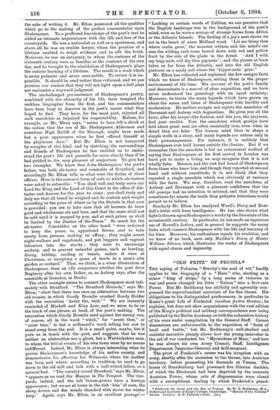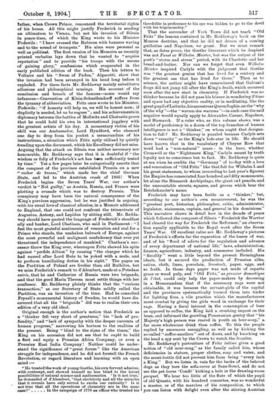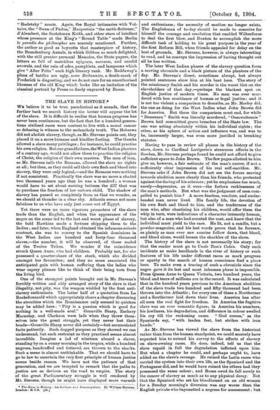THE saying of Polonius, "Brevity's the soul of wit," hardly
applies to the biography of a "Hero" who, starting as a minor "king of strips," by a long series of victories in war and peace changed his little "Nation" into a first-rate Power. But Mr. Reddaway has skilfully and agreeably com- pressed the superabundant materials of his fine theme. His obligations to his distinguished predecessors, in particular to Koser's great Life of Frederick (necdurn finitus Orestes), he explains, but does not show acquaintance with the vast edition of the King's political and military correspondence now being published by the Berlin Academy, or with the exhaustive history of his wars under compilation by the General Staff. Cameo dimensions are unfavourable to the exposition of "feats of broil and battle," but Mr. Reddaway's well-studied and realistic narrative plainly shows how the young innovator in the art of war conducted his "Myrmidons of Mars," and how he was always his own Army Council, Staff, Intelligence Department, Inspector-General, and drill-sergeant.
The pivot of Frederick's career was his irruption with an army, shortly after his accession to the throne, into Austrian territory, before presenting his demands at Vienna. The house of Brandenburg had possessed five Silesian duchies, of which the Electorate had been deprived by the suzerain Austrian Power, whose acts of dispossession were closed with a surreptitious dealing by which Frederick's grand-
* Frederick the Great and the Rise of Prussia. By W. E. Heddaway, Fellow and Lecturer of King's College, Cambridge. "Heroes of the Nations" Series. Loudon : G. P. Putnam's Sons. [5s.]
father, when Crown Prince, renounced the territorial rights of his house. All this might justify Frederick in sending an ultimatum to Vienna, but not his invasion of Silesia in peace-time, of which the King wrote to his Minister Podewils : "I have crossed the Rubicon with banners waving and to the sound of trumpets." His aims were personal as well as political. The first version of his Memoirs as recently printed verbatim lays down that he wanted to "acquire reputation" and to provide "his troops with the means .of gaining glory," confessions which evaporated in the early published edition of the book. Then his letters to Voltaire and his "Swan of Padua," Algarotti, show that the invasion had been arranged in his head long before it exploded. For these facts Mr. Reddaway mainly substitutes allusions and philosophical musings. His account of the conclusion and breach of the famous—some would say infamous—Convention of Klein-Schnellendorff suffers from the tyranny of abbreviation. Fritz once wrote to his Minister, Podewils : "if honesty will help us, we will be honest men ; if duplicity is needed, let us be rogues" ; and his achievements in diplomacy between the battles of Mollwitz and Chotusitz prove that he could hold his own in international jugglery with the greatest artists of his day. A momentary victim of his skill was our Ambassador, Lord Hyndford, who chanced one day to drop from his pocket a memorandum of his instructions, a situation which Fritz aptly utilised by quietly *reading upon the document, which his Excellency did not miss. Arguing that the attack on Silesia was neither necessary nor honourable, Mr. Reddaway says that it is doubtful if "the 'wisdom or folly of Frederick's act has been sufficiently tested by time." Yet a few pages later he categorically asserts that the conquest of the province established Prussia on a new
rocher de bronze," which made her the chief German
State, and led to the Austrian crash of 1866! When Frederick begins the Seven Years' War, our author's verdict is "Not guilty," as Austria, Russia, and France were plotting a crusade which. was to destroy Prussia. This conspiracy may have been the natural consequence of the King's previous aggression, but he was justified in arguing, with his usual love of classical allusion, in a Memoir addressed to England, that one could not confront the triumvirate of
Augustus, Antony, and Lepidus by sitting still. Mr. Redda- way should have quoted the language of Frederick's steadfast ally and banker, Lord Chatham, who said in Parliament : "I feel the most grateful sentiments of veneration and zeal for a Prince who stands, the unshaken bulwark of Europe, against the most powerful and malignant confederacy that ever yet threatened the independence of mankind." Chatham's suc-
cessor threw the King over, whereupon Fritz showed his spite against " perfide Albion" by causing "the charger which he had named after Lord Bute to be yoked with a mule, and to perform humiliating duties in his sight." The pages on the Partition of Poland are livelier than old Rulhiere, but we miss Frederick's remark to d'Alembert, made at a Potsdam
soirée, that he and Catherine of Russia were two brigands, and that the good Maria Theresa must settle things with her
confessor. Mr. Reddaway plainly thinks that the "curious transaction," as our Secretary of State mildly called the Partition, was an invention of the time. Had he consulted Fryxelrs monumental history of Sweden, he would have dis- covered that all the " brigands " did was to realise their own edition of a very old ideal.
Original enough is the author's notion that Frederick as a "thinker fell very short of greatness," his "lack of pro-
fundity," and "lack of sympathy with the deeper currents of human progress," narrowing his horizon to the realities of the present. Being "blind to the signs of the times," the Sing on his accession did not see that he ought to build a fleet and equip a Prussian Africa Company, or even a
Prussian East India Company ! Neither could he under- stand the significance of "great forces" like the American struggle for independence, and he did not foretell the French Revolution, or regard literature and learning with an open mind :—
" He treated the work of young Goethe, his own fervent admirer, with contempt, and showed himself no less blind to the latent possibilities of natural science and mathematics. 'Is it not true,' he demanded of d'Alembert, that electricity and all the miracles that it reveals have only served to excite our curiosity ? Is it uot true that all the operations of chemistry are in the same case?' In the campaign of 1778 an officer who trusted his
theodolite in preference to his eye was bidden to go to the devil with his trigonometry."
That the surrender of York Town did not teach "Old Fritz" the lessons contained in Mr. Reddaway's book on the Monroe doctrine, and that he did not dream of a coming guillotine and Napoleon. we grant. But we must remark that, as dates prove, the Goethe literature which he despised was not Faust or Wilhelm Meister, but was the output of the poet's "storm and stress" period, with its Charlotte and her bread-and-butter. Nor can we forget that even Wilhelm Meister inspired Carlyle with the judgment that Goethe was "the greatest genius that has lived for a century and the greatest ass that has lived for three." Then as to science, the author might have remembered that Galvani's frogs did not jump till after the King's death, which occurred soon after the new start in chemistry. If Frederick was no thinker because he did not pass his leisure in wondering if time and space had any objective reality, or in meditating, like the great pupil of Leibnitz, his ancestress Queen Sophie, on the "why of the why "—the " warum des warums "—in such case the said negative would equally apply to Alexander, Caesar, Napoleon, and Bismarck. If a ruler who, as this volume shows, was a model of proficiency in a dozen of the top branches of human intelligence is not a "thinker," on whom ought that designa- tion to fall ? Mr. Reddaway is puzzled because Carlyle seta down "veracity" as the King's lode-star in life. He should have known that in the vocabulary of Cheyne Row that word had a "non-natural" sense : in the hero, whether Cromwell or the "Nightmare King," Carlyle meant by truth loyalty not to conscience but to fact. Mr. Reddaway is quite at sea when he credits the " Germany " of today with a love and veneration of "Old Fritz" like that felt for Wilhelm I. and his great statesman, to whom (according to last year's figures) the Empire has consecrated four hundred and fifty monuments, let alone the Bismarck Archipelago, the giant vol pencils, and the uncountable streets, squares, and groves which bear the Reichskanzler's name.
Frederick may have been feeble as a "thinker," but, according to our author's own measurement, he was the "greatest poet, historian, philosopher, critic, administrator, legislator, statesman, captain, and general in his dominions." This narrative shows in detail how. in the decade of peace which followed the conquest of Silesia "Frederick the Warrior had cleared the way for Frederick the Reformer," an observa- tion equally applicable to the Royal work after the Seven Years' War. Of excellent value are Mr. Reddaway's pictures of Frederick's efforts for the reparation of the losses of war, and of his "flood of ediots for the regulation and advance of every department of national life," laws, administration, finance, agriculture, industry, and commerce included. His " fiscality " went a little beyond the present Birmingham ideals, but it secured the production of Prussian silks, satins, cloth, linen, porcelain, livestock, paper, eggs, and so forth. In those days paper was not made of esparto grass or wood pulp, and "Old Fritz," as premier domestigue de l'etat, could only help the paper-makers by decreeing in a Memorandum that if the necessary rags were not obtainable, it was because the servant-girls of the capital and the provinces systematically burned them into tinder for lighting fires, a vile practice which the manufacturers must combat by giving the girls wood in exchange for their rags. Having a fiscal interest in the consumption of beer as opposed to coffee, the King laid a crushing impost on the bean, and informed the growling Pomeranian gentry that "his Majesty's high person was reared in youth on beer-soup," a far more wholesome drink than coffee. To this the people replied by enormous smuggling, as well as by kicking the so-called " coffee-smellers " out of doors, and by knocking on the head a spy sent by the Crown to watch the frontier.
Mr. Reddaway's portraiture of Fritz intime gives a good notion of "old sour-mug," as the family called him, whose deficiencies in stature, proper clothes, soap and water, and the scent-bottle did not prevent him from being "every inch a King." But we listen in vain for the barks of the beloved dogs as they tore the sofa-cover at Sans-Souci, and do not see the pet horse Conde ' kicking a hole in the drawing-room parquet. We hear too little of the flute of which the pupil of old Quantz, with his hundred concertos, was so wonderful a master, or of the marches of his composition, to which you can listen with delight even after the stirring Austrian Radetsky music. Again, the Royal intimacies with Vol- taire, the "Swan of Padua," Maupertuis "the earth-flattener," d'Alembert, the Scotchman Keith, and other stars of intellect whose presence at the King's "Round Table" made Berlin le paradis des philosoph.e,s are scarcely mentioned. Further, the author as good as boycotts that masterpiece of history, the Brandenburg Annals, in which Gibbon so much delighted, with the still greater personal Memoirs, the State papers, the letters so full of matchless epigram, sarcasm, and candid avowals, and the rain of odes, pamphlets, and lampoons which give "Alter Fritz" such high literary rank. Mr. Reddaway's plans of battles are ugly, more Britannic°, a death-mask of Frederick is disgusting, and we do not care for an unauthorised likeness of the old King which looks like an imitation of the classical portrait by Pesne so finely engraved by Bause.












































 Previous page
Previous page